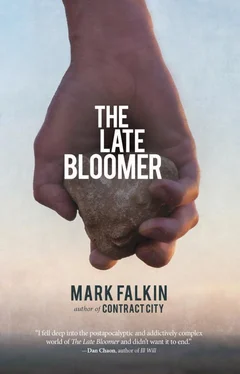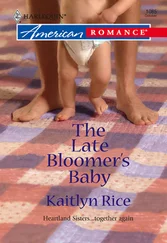Exiting your office and walking down the hall with the coach, I remember looking back at you. Your face fought itself. You attempted to give me the smile you’d wanted to give your unborn child, but your eyes failed you. Your mouth spread out in the mechanics of that smile, but the eyes didn’t follow. They were hollow.
That was the last time we saw each other.
And now I think that fake smile is the dark, glistening one overfull with teeth.
Turning my head back down the hall, my eyes snagged on the wet new tag across lockers, A Pox on Yo Lips . Gravity still pulling down lines of the paint.
We’d shared portions of a dream. Grandma Lucille, I know what you’d say.
To share a dream like that… I’m with you. Can’t believe that’s coincidence. No such thing as luck.
How did you go, Mr. E? Did you walk out into the gray of that morning before the sky evolved that awful blue? Choke and fall in your bedroom, public radio pledge drive purr looping? You and that hot, barren wife of yours, are you lying in your house together now, she in your too-big T-shirt, you caught mid-shave and shirtless, the spumed white hardened? Or did you both get that holy-rolling look on your faces and then do it together in a gleeful improv suicide pact? Did you seek out a high place from which to leap? Or something more local and brutal?
The way you dragged your finger pad along the edge of my page.
Ah, hell.
“You okay, Kev?”
I plopped down to ward off vertigo. I breathed. Bass said, “It’s going to be okay. It’ll get better. The shock is wearing off, reality settling in. I figure we got to push through it or we’ll never make it.”
With his bottom lip pooched out, he bobbed his head to these general terms like one might a funeral litany.
We made quick work of it then, tossing the stones off of her— clack! clack!— lifting her stiff, heavy, bug-riddled body into the back bed of the Bronco next to her husband. Somehow, loading the Flemings into the Bronco made us feel like maybe the world could be cleaned up, if not literally every body interred, at least we could envision the old world coming back. We extrapolated from these moments the rebirth of the world as we knew it.
I got the shovel from the garage.
The earth came up easily in the place Mr. Fleming had described in his note. Two guys digging, our breath visible fog in the chilling evening, silence but for the sniffing and the breathing and the scratch of the shovel and the sound of loosed dirt landing in a pile.
We made one hole. It wasn’t six feet, but deep enough. I got in the hole which came up to my waist and pulled them in. I hated to see how they lolled and flopped. Once they were both in, I situated them side by side and then we covered them without words, as this is the oldest of human tasks and no annotation was needed.
At night it began to rain. The patter comforted us, this sound of the world still living. Kodie opened a window. When we finally got in bed together, I flipped on the recorder.
I erased our conversation, most of it being too far away to hear. She whispered and cried, said she felt she was dying. Her fever spiked again and I nursed her all night, barely slept. Her coughing became so intense that she couldn’t stop for minutes at a time. We had to sit up. I brought her green tea nuked in the microwave. I thought of Bass’s mom as I did it, how he used to do this when her asthma got bad. Kodie could hardly speak. The worst of it was just before dawn, when she said, “I take it back.” She had grabbed my wrist hard and searched my eyes frantically, hers toggling back and forth between mine as mine did hers, neither of us able to alight on the other’s gaze. “Will you do the same for me as you did for your neighbors?”
At dawn, the wheeze slackened. She slept propped up with her mouth agape. I let her sleep. After a night like that, she can do what she wants. Though we have so much to do, all I want to do is take care of her, my Eve of the new world.
Though I erased this night’s conversation, [15] Somewhat incorrect. Everything was erased but those remembered, uttered words, the first words of this transcript.
I remember uttering, “please, God, don’t let her die” at dawn. The agnostic in the foxhole didn’t last long.
I’ll say it again now, in case she’s alive. God? Please don’t let Kodie die.
There. A little supplication can’t hurt.
Frankly, it’s why I’m even doing this book. Because now I think God might really be there and that I’m meant to do this. If I feel I’m meant to do this, then there must be meaning.
For I was feeling stronger as all around me grew weak.
Obvious with Kodie, but I also saw it in the oncoming gauntness of Bastian’s face. His shoulders slumped and he wheezed. They’re winding down like windup toys having lost the kinetic energy twisted into them.
I’m being wound up. Stayed up with Kodie all night long and yet I feel no fatigue.
The death that has come comes slowly for us late bloomers. Just like in my story. There’s still enough kid in us, ersatz Peter Pans, and the death is stymied, but would it be denied?
Kodie and I had been going down the street, house by house, breaking and entering, filling the bathtubs. Her breathing had cleared and she had energy for the task. Many of the doors we came to were unlocked, but a few times we busted in through a window.
Entering each was harrowing. The interiors mausoleum-still, the dim window-lit spaces. Kodie, ever hopeful, insisted on calling out hello? each time. Her call echoed through the halls and empty rooms.
It got to where we did two at a time, she in one, me in the other, filling. I filled the tubs in the houses that had corpses. I didn’t linger around them much, tried to pretend they weren’t there, whistling while I worked to keep the creep from settling on the back of my neck. Of course, the more you ignore, the more the feeling back-builds within and soon I was sensing movement in other rooms. Thought I’d heard a shuffling, a creek of wood, a groan. I’d turn off the water and stop whistling to listen.
Oh, the silence of the world sucks to behold, dear reader.
Each of the ten or so we saw died of the white save one. The ones that died of the white were all on the floor, usually near an unlatched door or open window. A kitchenette chair knocked over. Everyday things scattered on the floor—stacked mail, breakfast cereal, toothbrush and paste—from the last throes.
I took the houses with corpses. You knew from the porch. The one suicide was a block over from my house, a house smaller than ours and painted fire-engine red. On the entry wall hung a still spot-lit painting of a melodramatic Old West winter scene—two cowboys and a Native American guide bent against the wind on horseback, oceanic tundra all around. I got up close to it and saw that the paint had become alligatored on the canvas. I couldn’t make out the signature at the corner. On the entry table were pictures of two men in various loving poses, wearing suits, tuxes, matching turtleneck sweaters. In one they held a small dog you knew was yappy as hell. The men were in their sixties, I’d guess. The house was in no disarray and the décor was contempo and clean if not breathtaking. That is, other than the cowboy painting from the mid-1800s. Seeing it spot-lit like in a gallery; that did take my breath. My mind vaulted to all the world’s art, the museums which had become themselves still-lifes, white emergency lights pulsing in their corridors.
The guy I found was in the kitchen. Several drawers were open and a few implements strewn on the floor from his riffling. The man wore a robe but it was open and splayed under him. He lay nude and spread-eagled in his remodeled midcentury-modern kitchen, a cone of light from the stove focusing on the gash across his throat from ear to ear. The wound had blackened and puffed to something like a rotten eggplant, one made so deep that the blood had simply fallen out onto the floor. The entire kitchen was a kidney-shaped tarry sea stilled by air, gravity, and time. A huge and expensive Japanese kitchen knife was stuck in the middle of the blood, an artifact in amber. The smell and the sight made me catch puke in my mouth and my eyes water. I thought I was getting used to it, a blasé veteran. Not quite.
Читать дальше












